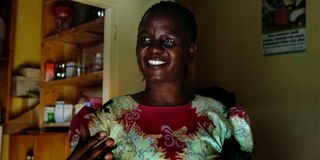A nurse’s legacy that’s changing Kibra’s maternal healthcare narrative

The late Tabitha Festo, the co-founder of Carolina For Kibera.
What you need to know:
- Tabitha Atieno Festo started what would become ‘Carolina for Kibera’ when she opened her one-roomed clinic in the populous slum in 2000.
- In 2004, Tabitha died after a short illness.And while she may be long gone, her legacy lives on.
- Tabitha Maternity Home in Kibra, which operates 24 hours a day, seven days a week.
What began as one woman’s determination to provide healthcare services in Kibra slums, has ballooned into a grand project covering informal settlements around the country.
Tabitha Atieno Festo, a widowed registered nurse, started what would become ‘Carolina for Kibera’ when she opened her one-roomed clinic in the populous slum in 2000.
She partnered with Rye Barcott, a student at the University of North Carolina in the United States (US). At the time, he was doing his research on youth empowerment and ethnic violence in Kibra.
They were able to attract support from well-wishers in the US. Working with another Kenyan and community mobiliser Salim Mohamed, they registered the organisation in 2001, and named it after their abroad donors.
In 2004, Tabitha died after a short illness. And while she may be long gone, her legacy lives on. At the helm of its continuity is Hillary Omala. He serves as the Executive Director of the non-governmental organisation, which he first learned about while working for a government health programme.
Tabitha Maternity Home
“People living in informal settlements know what their problems are, and they have ideas on how to address them. They just need the knowledge and resources to do that,” said Mr Omala.
Childbirth is one major gap in public health in slums. To respond, the non-profit set up the Tabitha Maternity Home in Kibra, which operates 24 hours a day, seven days a week. The facility has delivered over 1,000 babies since opening in 2019 and now averages 60 deliveries per month.
“To date, we have recorded zero maternal deaths, an achievement in Kenya where the maternal mortality rate is 342 per 100,000 deliveries each year,” noted Mr Omala.
They improve and integrate the existing informal care networks rather than seeking to supplant them with nurses hired from outside the community.
Traditional birth attendants receive additional training, and are invited to be care-group volunteers who can refer pregnant women to the maternity home.
In 2020, the Gates Foundation acknowledged staff members at the maternity home as Frontline Heroes for ensuring continuity of care during the Covid-19 pandemic.
Recently, the organisation has redoubled its efforts in addressing gaps in maternal and reproductive health.
“Pregnant women in informal settlements lag behind in antenatal care, which we address through our maternal health programs,” he said.
HIV testing
Their services include pregnancy assessments and education on healthy behaviours, warning signs during pregnancy and childbirth, micronutrient supplementation and treatment for hypertension to prevent pregnancy related seizures.
Additionally, they offer psychosocial support, HIV testing and medications to prevent mother-to- child transmission and treatment of malaria in women who travel to endemic areas.
Another major gap in public health informal settlements is basic immunisation. CFK Africa provides the full range of shots to infants under the Kenya Expanded Programme Immunisation (KEPI) Schedule. These vaccines protect babies against illnesses and diseases such as tuberculosis, measles, mumps, typhoid, chicken pox, meningitis, rotavirus, tetanus, and polio, among other diseases.
In 2021, Mr Omala led the organisation, which had marked two decades of service in Kibra, on its biggest expansion to date, developing plans to add services in informal settlements across Nairobi County and seven other counties in Kenya: Kajiado, Kiambu, Kilifi, Kisumu, Machakos, Mombasa and Nakuru.
That same year, Carolina for Kibera saw its name change to CFK Africa which was indicative of the direction the organisation was taking and reflective of its growth.
In November 2022, the organisation was recognised for its work with an award from the Triangle Business Journal, a prominent publication in North Carolina, where their US office is based.
The organisation also works with community health volunteers to set up community toilets to reduce ‘flying toilets’, plastic bags of waste that can spread waterborne diseases such as cholera.





